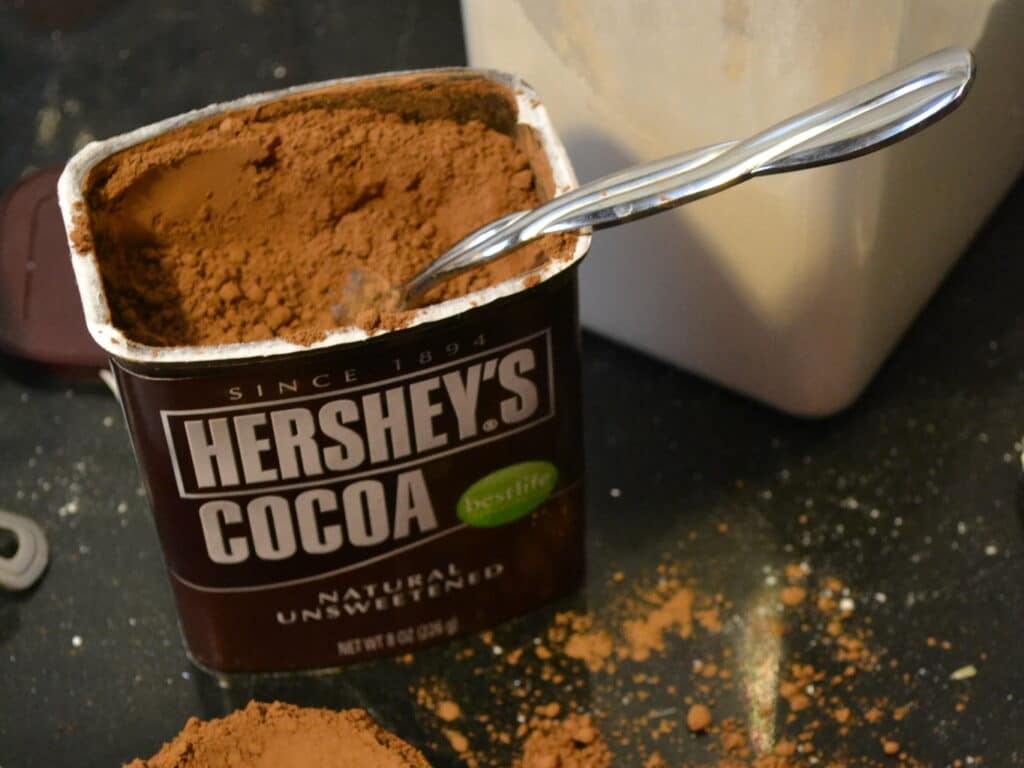Key Takeaways
- Cocoa powder contains theobromine and caffeine, both of which are toxic to our canine companions
- Dry cocoa powder can contain a whopping 700 mg theobromine/oz
- Just a half oz of cocoa powder could be toxic to a small pooch
You’re making a delicious hot chocolate and spill some of the cocoa powder, but before you can do anything, your pooch has managed to lick every bit off the floor. Now, what should you do?
First thing’s first, call your veterinarian or The Pet Poison Helpline at (855) 764 7661 immediately. They will give you the best advice about what to do for your dog.
Read on to find out more about why cocoa powder is toxic to dogs and what you can expect when your DVM is treating your dog for cocoa powder poisoning.
How much cocoa powder is toxic to dogs?
Cocoa powder is extremely toxic to our canine counterparts, with just a half oz being a toxic amount for small and medium-sized pooches. Cocoa powder contains highly concentrated amounts of theobromine, between 400-700 mg/oz cocoa. In comparison, dark chocolate contains 450mg of theobromine/oz chocolate.
If your pooch eats any cocoa powder, you should contact the Pet Poison Helpline and your DVM immediately. Remember, just a half oz cocoa powder could spell toxic complications for your dog, and the sooner your dog can receive treatment, the better their prognosis for recovery.
What to do if my dog ate cocoa powder?
If your pooch has eaten any cocoa powder, then you should immediately contact the Pet Poison Helpline at 1 (855) 764 7661.
Weigh your dog to help ascertain if your dog has eaten a toxic quantity for its size. You should always consider cocoa powder ingestion to be an emergency because it contains almost twice the amount of theobromine than even some dark chocolate brands.
Cocoa powder can contain up to twice as much theobromine as some dark chocolate brands, and it should always be considered an emergency if your dog eats some cocoa powder.
When to see a vet?
As cocoa powder contains up to 700mg of theobromine/oz, you should arrange an appointment with your veterinarian as soon as possible. This is doubly important if your dog is small, very young, elderly, or has any underlying health conditions. Your veterinarian will weigh your dog to accurately determine if your pooch has eaten a toxic dose of cocoa powder.
Always treat cocoa powder ingestion as an emergency, even though your dog may seem completely fine. Even if your dog hasn’t eaten a toxic dose, gastro-protectant medications will help treat potential tummy upsets.
What if my dog ate plenty of cocoa powder but seems fine?
It can take up to 6 hours for digestion to complete and for the theobromine contained within cocoa powder to be fully absorbed into your pooch’s bloodstream. Once digestion has started, clinical signs can start to appear. These include diarrhea, vomiting, restlessness, and panting.
Ideally, your dog should have treatment started before clinical signs start, but this isn’t always possible. Once you note that your dog has eaten some cocoa powder, then you should contact your veterinarian for an emergency appointment to start treatment immediately.
Signs that my dog got cocoa powder poisoning
While you may not see the signs of cocoa powder poisoning for some hours, the clinical signs often start with tummy upset such as vomiting and diarrhea.
The toxic component in cocoa powder is theobromine which isn’t metabolized by dogs the way it is in humans. The severity of clinical signs depends on how much cocoa powder is eaten and can even last for days.
As well as the signs of gastrointestinal distress, other common clinical signs are listed below:
- Increased Thirst
- Increased Urination
- Panting
- Restlessness
- Racing Heartrate
Severe cases of theobromine toxicity can include seizures, muscle tremors, and even heart failure, coma, and death. While chocolate poisoning is rarely fatal, cocoa powder is much more potent, and death is more likely than with regular chocolate poisoning.
Common signs of theobromine toxicity include vomiting and diarrhea, increased urination, and thirst. Unlike chocolate, the concentration of theobromine is much higher in cocoa powder, and if large quantities are eaten, then signs can include muscle tremors, seizures, and heart failure, which can be fatal.
What happens to dogs that eat cocoa powder?
The rapid absorption of theobromine means that signs can take just a few hours and can persist for days in severe cases. This is because theobromine is filtered through the kidneys and excreted in urine but can be reabsorbed through the bladder wall back into the bloodstream, thus prolonging the ill effects.
Affecting the heart, nervous and gastrointestinal systems causes significant inflammation, a racing heart rate, incoordination, and even seizures. The clinical signs can persist for days due to theobromine being reabsorbed back into the bloodstream unchanged.
Why is cocoa powder toxic to dogs?
Theobromine, the active toxin, stimulates the heart causing racing heart rates, blood vessel dilation, and even heart failure. It also acts as a diuretic and muscle relaxant and can be used medically, but because our pooches can’t metabolize theobromine in the same way as humans, they are much more sensitive.
Due to its action on the heart, kidneys, and nervous system, alongside the gastrointestinal distress experienced by dogs after eating cocoa powder, theobromine can cause serious damage to your dog’s body.
How do vets treat cocoa powder poisoning?
As with most toxins, the treatment will vary depending on how much was eaten. If your canine counterpart has eaten the cocoa powder within the previous couple of hours, your veterinarian will inducel vomiting. In order to reduce the amount of theobromine that’s absorbed into the bloodstream, activated charcoal will also be administered. Antacids will also help with tummy upsets and diarrhea caused by theobromine.
There’s no specific antidote or treatment for theobromine poisoning, but your veterinarian will provide aggressive supportive therapy, including intravenous fluids, to encourage flushing your dog’s system. Frequent pee breaks or even a urinary catheter will help theobromine elimination and minimize its reabsorption from the bladder back into your dog’s bloodstream.
Your dog’s veterinarian will also monitor your pooch’s heart, blood pressure, and nervous system to determine if other medications are needed. How long it takes your dog to recover will depend on how much cocoa powder has been eaten.
Your veterinarian will induce emesis if your dog ate cocoa powder recently. Supportive therapy is essential to help eliminate theobromine from your pooch’s system, while monitoring will help your veterinarian determine if your dog needs cardiac medication or anti-convulsants.
Final Woof
Recovery from cocoa powder poisoning depends on the amount eaten and what clinical signs are present. Remember the severity and duration of these clinical signs are directly determined by how much cocoa powder was eaten. If your pooch ate just a small amount, they might have an upset tummy for just a few hours, while larger amounts will take longer due to the reabsorption of theobromine from the bladder back into your dog’s bloodstream.
The theobromine concentration in cocoa powder is much higher than in chocolate, even dark chocolate, so only a small amount can cause severe cardiac and nervous symptoms and may even be fatal. Remember early, aggressive treatment is essential to prevent significant damage to your dog’s heart and kidneys.


